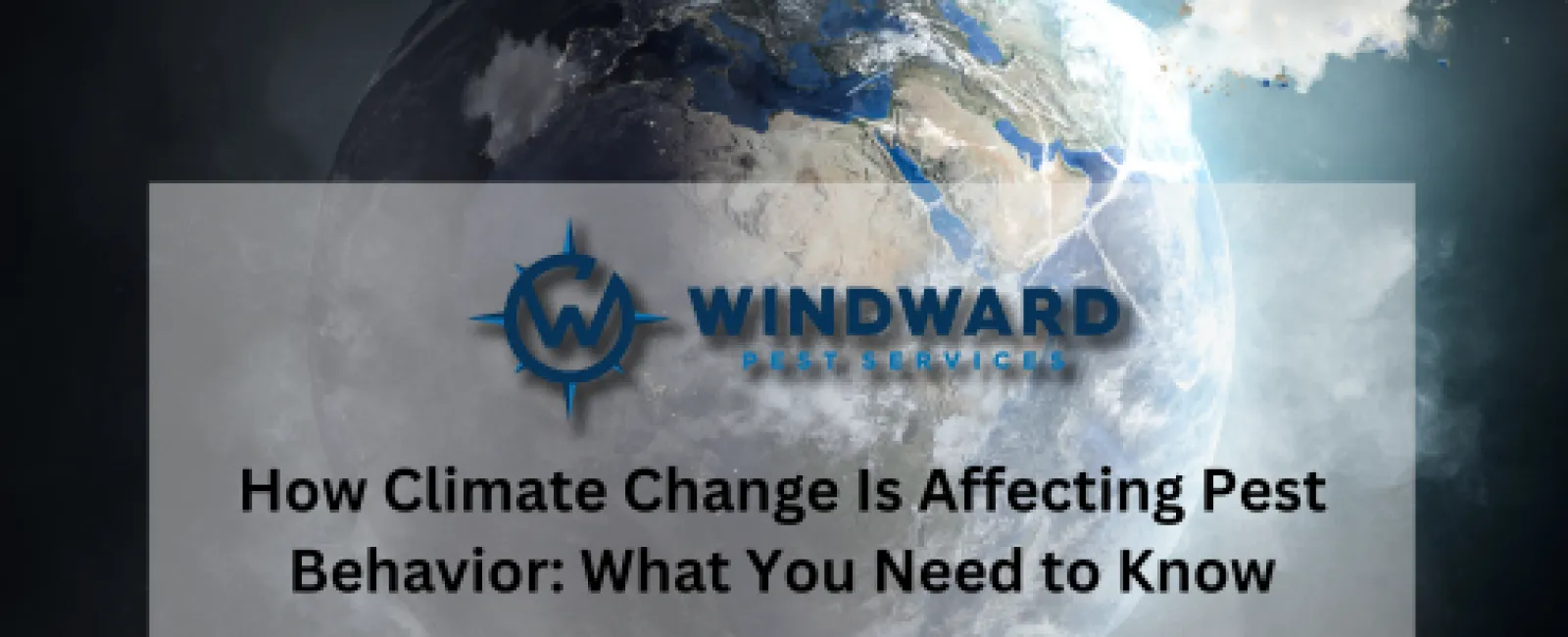Climate change is no longer a distant threat—it's a reality that's reshaping our world in profound ways. From rising temperatures to shifting weather patterns, these changes are not only impacting the environment but also influencing the behavior of pests. For homeowners in Atlanta and beyond, this means that pest control is becoming more challenging and more critical than ever. As pests adapt to new conditions, they're migrating to new areas, becoming more active, and posing greater risks to homes and health.
In this article, we'll explore how climate change is affecting pest behavior and what it means for you as a homeowner. We'll discuss specific pests that are becoming more prevalent due to warmer weather conditions and how these changes are impacting Atlanta and the surrounding areas. Whether you're dealing with rodents, insects, or other pests, understanding these trends is key to protecting your home. Windward Pest Services is here to help with expert Atlanta pest control solutions, including interior and exterior pest treatments, pest inspections, and quarterly services. Let's dive into the details and uncover what you need to know about climate change and pest behavior.
The Connection Between Climate Change and Pest Behavior
Climate change is altering ecosystems in ways that directly impact pests. Warmer temperatures, increased humidity, and more frequent extreme weather events are creating ideal conditions for many pests to thrive. These changes are causing pests to:
Expand Their Range: Pests that were once limited to specific regions are now migrating to new areas.
Breed More Frequently: Warmer temperatures accelerate the reproductive cycles of many pests, leading to larger populations.
Become More Active: Pests are remaining active for longer periods throughout the year, rather than going dormant during colder months.
For homeowners, this means that traditional pest control methods may no longer be sufficient. Proactive measures, such as regular pest inspections and quarterly services, are essential for staying ahead of these evolving threats.
Pests on the Move: How Climate Change Is Shifting Pest Populations
As temperatures rise and weather patterns shift, certain pests are becoming more prevalent in Atlanta and other regions. Here are some of the pests most affected by climate change:
1. Rodents: A Growing Threat in Urban Areas
Rodents, such as mice and rats, are highly adaptable and thrive in urban environments. Warmer winters and milder weather are allowing rodents to remain active year-round, increasing the likelihood of infestations. Additionally, extreme weather events like floods can drive rodents indoors in search of shelter and food.
What You Can Do:
Rodent Exclusion: Seal gaps, cracks, and holes in your home's exterior to prevent rodents from entering.
Regular Inspections: Schedule pest inspections with Windward Pest Services to identify and address rodent activity early.
Quarterly Services: Enroll in a maintenance plan to ensure ongoing protection against rodents.
2. Mosquitoes: Longer Seasons and Greater Risks
Mosquitoes are highly sensitive to temperature and humidity, making them one of the pests most affected by climate change. Warmer weather extends the mosquito breeding season, while increased rainfall creates more standing water for them to breed in. This not only leads to more mosquitoes but also increases the risk of mosquito-borne diseases like West Nile virus and Zika virus.
What You Can Do:
Eliminate Standing Water: Regularly empty birdbaths, flower pots, and gutters to reduce breeding sites.
Exterior Treatments: Invest in professional exterior pest treatments to reduce mosquito populations around your property.
3. Termites: More Active and Destructive
Termites thrive in warm, humid conditions, and climate change is creating the perfect environment for them to flourish. Warmer temperatures allow termites to remain active throughout the year, increasing the risk of damage to homes and structures. Additionally, extreme weather events like hurricanes can displace termite colonies, leading to new infestations in previously unaffected areas.
What You Can Do:
Reduce Moisture: Fix leaky pipes, ensure proper drainage, and use dehumidifiers in crawl spaces.
Regular Inspections: Schedule termite inspections with Windward Pest Services to detect early signs of infestation.
4. Ticks: Expanding Their Range
Ticks are another pest that benefits from warmer temperatures and increased humidity. As their range expands, they're becoming more common in areas like Atlanta, where they were once less prevalent. This increases the risk of tick-borne diseases such as Lyme disease and Rocky Mountain spotted fever.
What You Can Do:
Keep Your Yard Maintained: Trim grass, remove leaf litter, and create a barrier between wooded areas and your lawn.
Protect Yourself: Use insect repellent and wear long sleeves and pants when spending time outdoors.
5. Cockroaches: Thriving in Warm, Humid Conditions
Cockroaches are notorious for their ability to survive in harsh conditions, but they thrive in warm, humid environments. As temperatures rise, cockroaches are becoming more active and reproducing more quickly. This makes them a growing concern for homeowners, especially in urban areas like Atlanta.
What You Can Do:
Seal Entry Points: Inspect your home for cracks and gaps, especially around windows, doors, and foundations.
Keep Your Home Clean: Store food in sealed containers, clean up spills immediately, and take out the trash regularly.
How Windward Pest Services Can Help
At Windward Pest Services, we understand the challenges posed by climate change and its impact on pest behavior. That's why we offer comprehensive pest control solutions tailored to the unique needs of Atlanta homeowners. Our services include:
Interior and Exterior Pest Treatments: We target pests both inside and outside your home to provide complete protection.
Pest Inspections: Our thorough inspections identify potential issues before they become major problems.
Quarterly Services: Our maintenance plans ensure ongoing pest control to keep your home pest-free year-round.
Rodent Exclusion: We specialize in sealing entry points and implementing exclusion techniques to prevent rodents from entering your home.
Climate change is reshaping the world we live in, and its impact on pest behavior is undeniable. From rodents and mosquitoes to termites and ticks, pests are becoming more active, more widespread, and more difficult to control. For homeowners in Atlanta, this means that proactive pest management is more important than ever.
By understanding how climate change is affecting pest behavior and taking steps to protect your home, you can stay ahead of these evolving threats. Windward Pest Services is here to help with expert Atlanta pest control solutions, including interior and exterior pest treatments, pest inspections, and quarterly services. Don't wait until pests become a problem—take action today to safeguard your home and family.

